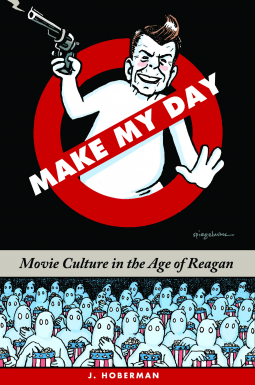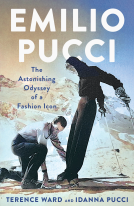
Make My Day
Movie Culture in the Age of Reagan
by J. Hoberman
This title was previously available on NetGalley and is now archived.
Send NetGalley books directly to your Kindle or Kindle app
1
To read on a Kindle or Kindle app, please add kindle@netgalley.com as an approved email address to receive files in your Amazon account. Click here for step-by-step instructions.
2
Also find your Kindle email address within your Amazon account, and enter it here.
Pub Date Jul 02 2019 | Archive Date Jul 02 2019
Talking about this book? Use #MakeMyDay #NetGalley. More hashtag tips!
Description
Named a Best Book of the Year by Financial Times
"Singular, stylish and slightly intoxicating in its scope."
—Rolling Stone
Acclaimed media critic J. Hoberman's masterful and majestic exploration of the Reagan years as seen through the unforgettable movies of the era
The third book in a brilliant and ambitious trilogy, celebrated cultural and film critic J. Hoberman's Make My Day is a major new work of film and pop culture history. In it he chronicles the Reagan years, from the waning days of the Watergate scandal when disaster films like Earthquake ruled the box office to the nostalgia of feel-good movies like Rocky and Star Wars, and the delirium of the 1984 presidential campaign and beyond.
Bookended by the Bicentennial celebrations and the Iran-Contra affair, the period of Reagan's ascendance brought such movie events as Jaws, Apocalypse Now, Blade Runner, Ghostbusters, Blue Velvet, and Back to the Future, as well as the birth of MTV, the Strategic Defense Initiative, and the Second Cold War.
An exploration of the synergy between American politics and popular culture, Make My Day is the concluding volume of Hoberman's Found Illusions trilogy; the first volume, The Dream Life, was described by Slate's David Edelstein as "one of the most vital cultural histories I've ever read"; Film Comment called the second, An Army of Phantoms, "utterly compulsive reading." Reagan, a supporting player in Hoberman's previous volumes, here takes center stage as the peer of Indiana Jones and John Rambo, the embodiment of a Hollywood that, even then, no longer existed.
Available Editions
| EDITION | Other Format |
| ISBN | 9781595580061 |
| PRICE | $28.99 (USD) |
| PAGES | 400 |
Links
Average rating from 3 members
Featured Reviews
 Helen C, Reviewer
Helen C, Reviewer
Film historian J. Hoberman's point is that ultimately all movies exist to do the same thing—offer nostalgia for supposedly better times. Even a trashy movie like Earthquake provides a catharsis.
Another way of saying the same thing is to quote one of the first female directors in Hollywood. Doris Wishman, director of Nude on the Moon and similar films said: “All movies are exploitation movies.”
Hoberman might not go that far, but I would.
In Make My Day, Hoberman compares movies from the sixties, seventies, and eighties, for example what he calls Watergate films like Jaws and Nashville.
Film critic Kenneth Turan wrote he had seen the future and it was Jaws. That turned out to be prescient. And while Nashville was about the entertainment machine, Jaws was the machine.
It shouldn't be surprising that Spielberg worries about his movies as much as filmmakers like Robert Altman and Warren Beatty, nor surprising he's as involved with the philosophy in his films as with the technology.
But we've seen the future and it's Jurassic Park.
Another theme running through this book is what Hoberman calls the Cold War kinderkultur that runs from Davy Crockett to Star Wars. (I recently read that Disneyland is about open a new Star Wars land. Davy Crockett and Han Solo have a lot in common.)
One reason I like reading Hoberman's books is that he realizes politics is more important than movies. He tells the story of the Shah of Iran being overthrown as Michael Cimino's Deer Hunter was released. Hoberman lets us know when atrocities committed by real people are ascribed to others in the movies. (For instance, we were prepared for the Russian roulette scenes in Deer Hunter by the famous documentary clip of a North Vietnamese soldier being shot in the head by a South Vietnamese officer.)
Real people inhabit various historical figures.
Ronald Reagan is compared to Chance the gardener from Jerzy Kosinski's novel and Hal Ashby's film Being There.
John Hinkley Jr. is an example of the Secret Agent of History, who by his failure to assassinate Reagan redeemed the killing of JFK and the turn away from original American values that the country supposedly took in 1963.
Robert de Niro's Travis Bickle, another Secret Agent of History, gave way to Sylvester Stallone's Rambo, now a Hollywood Freedom Fighter.
Is it possible for us to wake up from this Dream Life?
(Thanks to NetGalley and New Press for a digital review copy.)
 nathan h, Reviewer
nathan h, Reviewer
Having worked for the Village Voice and seen this first-hand, Hoberman is quite an appropriate author for a book of this nature. It takes a bit of a long on-ramp into the Reagan presidency (covering his film career, touching upon the political and film landscapes prior to Reagan's taking of the reins, as well as giving big news events to assist in keeping a grip on context), but it gets there.
Covering the years he was Commander-in-chief, we get to see a structured 1-2-3 combo of the major events occurring under Reagan, the films premiering under his watch, and, just as important, the movies he screened (also, what he thought of them, if hearsay and/or his personal diary has any information to distribute). If applicable, Hoberman also peppers in various film reviews, including snippets from his own, to help out.
This all is topped off by a few pages on our current media-obsessed president; Hoberman's thoughts are quite profound, I think.
I find it easy to forget that Reagan, coming from Hollywood, always kept a toe dipped into that pond. The films he watched (or didn't watch) say a lot without saying anything. Since he helped shape the 80s, an examination such as the one that Hoberman has written is pretty incredible. One of the books he mentions, Susan Jeffords' HARD BODIES, is equally fantastic and mind-blowing, although she focuses more on male masculinity and how that shifted through film over the course of the Reagan era (and just a little bit afterward).
If political books are the bane of your existence, you might find some of these pages to be torturous, but it's all pretty cool to look at on a grander scale. Any fan of films from the 80s should be checking this out.
Many thanks to NetGalley and The New Press for the advance read.





